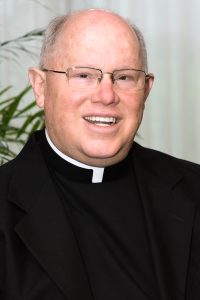 A monthly series in Vincentian Voices where we ask five random questions to an Eastern Province Priest or Brother.
A monthly series in Vincentian Voices where we ask five random questions to an Eastern Province Priest or Brother.
This month, we talk with Fr. Bruce Krause, CM, who serves at St. Mary of the Mission Parish in Opelika, Alabama. We thought we’d ask Fr. Krause a few questions.
What was your favorite course or subject in school and why?
Unlike my younger brother whose interests were in the sciences, I preferred the arts. My major in college happened to be German, and it was an independent reading course of works by Hermann Hesse, in the original language, that I especially enjoyed. I found such works as Sidhartha, Narcissus and Goldmund, and Demian engrossing. Besides this course, I enjoyed the renowned scripture scholar Dr. Walter Bruggemann’s class on the prophet Jeremiah while preparing for a doctor of ministry degree at Emory University. He was demanding of his students, and you best be prepared to answer questions in class. Bruggemann, a walking, talking library, presented a vivid picture of the prophet’s message and person that seemed pertinent in Jeremiah’s day and relevant in our own. He gave his all to the class, and the conscientious student was bound to benefit from his lectures. I certainly did.
What movie have you seen the most times? Please explain.
I have to admit to you that I am not much of a movie goer. I cannot recall seeing a movie more than once that has remained a favorite of mine. That said, I do have a fond recollection of the first movie I ever saw. It was “Swiss Family Robinson” when I was just 7 years old at the fabulous Fox Theater in Atlanta. The theater itself was as captivating to me as the very movie I saw on screen. The theater has a plush, Arabian décor and a ceiling that is reminiscent of the night sky. The theater is still in operation and well worth a visit.
A truly compelling movie for me was about the Trappist monks in Algeria, “Of Gods and Men.” Rather than living in isolation from their neighbors, these men formed meaningful relationships with the Muslims in their village. These monks reminded me of the monks I got to know at the Monastery of the Holy Spirit, in Conyers, GA (just east of Atlanta) while living in Atlanta in the early 60’s. My mom, brother and I frequently went to Sunday Mass at the monastery. A couple of the monks who ran the guest house and shop made a point of getting to know us, and knew our names. I witnessed the same in this movie and of the monks’ commitment to the people in the grips of a menacing civil war. In their decision to remain in Algeria rather than return to France, these monks showed the full depth of their devotion to the people that included their martyrdom. I found their witness as portrayed in this movie quite inspiring.
If you could ask Saint Vincent de Paul one question, what is the question and why?
Saint Vincent, as you know, spoke frequently of Divine Providence. When I expect confreres in his day had their doubts about a certain mission (Madagascar, for example) because of the deaths of several men, I wonder how Saint Vincent could persuade his men then and now about undertaking a new work when the laborers are few. What would Saint Vincent say to you and me? The question seems especially relevant to me when we are less inclined to undertake a new mission because of shortages in personnel and resources. What would Saint Vincent convey to us about his conviction in Divine Providence that might redirect some of our works in the Eastern Province and the Congregation of the Mission world wide?
Besides connecting with family and friends, what do you like to do in your free time?
As many in the Province know, I am an avid golfer, although the times that I play a round of golf are few and far between now. My interest in the game began with the encouragement of a confrere, Fr. James Salway, CM, who took my brother and I out for a round of golf at a local course in Lanett, Alabama in the mid 60’s. We both fell in love with the game that presented numerous challenges and rewards after a well-executed shot. Occasionally I still manage to shoot a round in the 70’s, although it is more likely to be in the high 80’s now. I seriously doubt that I will ever be able to shoot my age.
Besides golf, I thoroughly enjoy reading. It is a pastime that I gained from my mom who was herself an avid reader and librarian by profession. My choice of books is somewhat eclectic. I enjoy a good mystery, fiction, biography, and even historical works.
Another interest is classical guitar. I began learning how to play the guitar while in the novitiate. However, it was while I was at Mary Immaculate Seminary in my last two years that I began in earnest to study the guitar with the help of an instructor in Allentown. I continued to receive lessons from him during my first assignment at the Immaculate in Philadelphia.
Unfortunately, I discontinued playing for a number of years, and have only recently resumed picking up what I might call a long-lost friend. At times, I feel there is more grinning than picking.
If you could have dinner with one non-religious historical figure (dead or alive), who would it be and why? What might you ask them?
To be honest, I could easily mention several different personages. The person I would choose to have dinner with is Rosa Parks. Being a native of Alabama and having recognized within myself my own prejudices growing up in the South, I know change is necessary. Together with members of the St. Vincent de Paul conference at St. Mary’s, we have discussed some hard, personal questions around racism and white privilege. The sins of our nation are lamentably now present in the tragic and brutal killings of African-Americans and persons of color. Bigotry was in full display on January 6th at our nation’s capital, when rioters waved the Confederate flag. Certainly, Mrs. Rosa Parks would have understood well how she needed to take a stand against white privilege while riding on a Montgomery bus. Her courageous step led to the Montgomery bus boycott, and was an important catalyst in the Civil Rights movement. There is much work that remains to be done to address systemic racism in this country. I would be interested in learning from her what changes she would advocate for, today, as a nation. What strategy does she think would work to change minds and hearts? How might a grass roots effort be undertaken? What advice would she give me as a native Alabamian?

